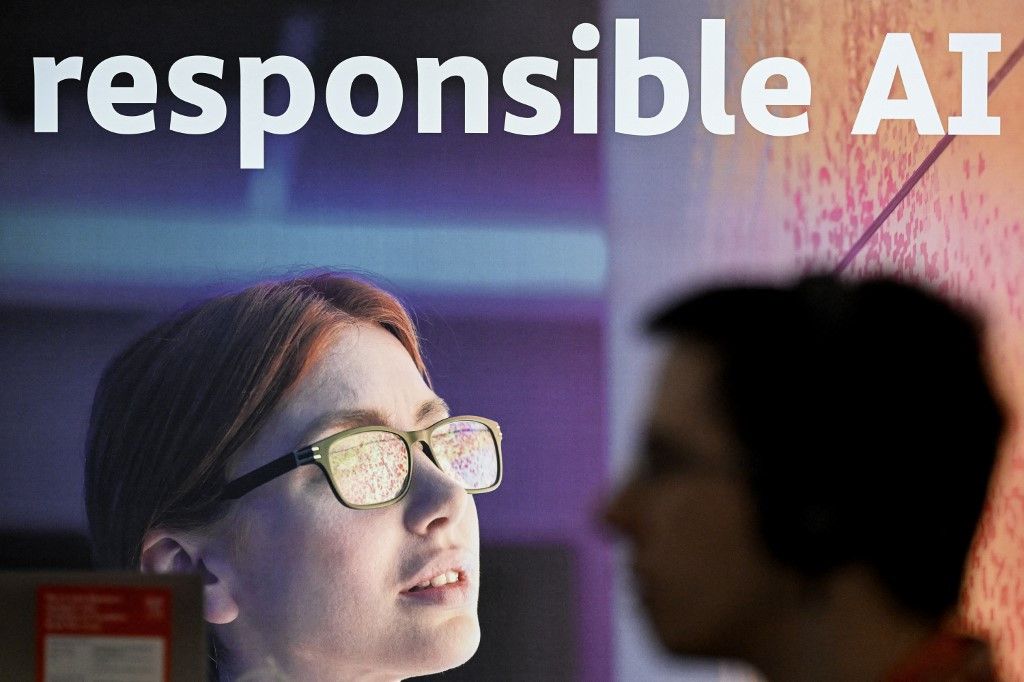Popular Reads
Top Results
Can't find what you're looking for?
View all search resultsPopular Reads
Top Results
Can't find what you're looking for?
View all search resultsResponsible AI needs shared responsibility to safeguard trust
As AI adoption races ahead, the same tools driving personalization and efficiency are also unlocking new dangers, from biased credit scoring and data misuse to ever more cunning financial scams.
Change text size
Gift Premium Articles
to Anyone
A
rtificial intelligence has become one of the defining megatrends reshaping global finance, joining digital assets, cybersecurity and evolving customer expectations as forces transforming how the world banks, invests and safeguards value. For financial institutions, AI is now both a frontier of opportunity and a test of responsibility.
The AI market is projected to reach US$900 billion globally by 2026, nearly doubling in just four years. In banking and finance, the adoption of generative AI alone is projected to rise by around 75 percent by 2027 as institutions deploy it across risk management, customer engagement, product innovation and beyond.
This transformation has important implications for Indonesia as it seeks to further expand financial access and enhance the maturity of the national banking ecosystem.
We already see AI becoming embedded in daily financial life, from chatbots and digital credit scoring to fraud detection and algorithmic trading. But as adoption accelerates, these same capabilities that deliver personalization and efficiency can also expose new risks, from biased credit models to data misuse and increasingly sophisticated financial scams.
The challenge ahead is not whether to embrace AI, but how to do so responsibly.
Scepticism to scale with AI
The world has witnessed a remarkable shift in AI adoption in the last year, as companies experiment with increasing enthusiasm. The finance sector stands at the center of this transformation, with ‘Agentic AI’ emerging as a particularly powerful force.
Unlike traditional AI that merely analyses or predicts, Agentic AI acts, completing workflows, learning from feedback and working alongside humans as a digital colleague. An AI assistant can now scan live portfolio data, flag clients at risk of churn, draft personalized outreach messages, pre-fill loan approvals and summarize meetings in real time. Tasks that once took days now happen in minutes, allowing humans to focus on judgment, empathy and client relationships.
This convergence of human expertise and digital intelligence is redefining productivity, unlocking a new frontier of AI adoption in the industry. As these capabilities evolve, so to do the pressures to protect and secure the ecosystem.
When innovation meets exploitation
AI brings many benefits, but it is also being subverted by criminals for illegal gain. In 2024, a United Kingdom engineering firm lost 20 million pounds ($26.2 million) when scammers used a deepfake video call to impersonate senior executives. In the United States, voice-cloning technologies have tricked individuals into transferring funds.
Indonesia faces similar threats. Between November 2024 and August 2025, scam-related losses exceeded Rp 4.6 trillion ($275.4 million). Despite strong enforcement by the Anti-Scam Center (ASC) from the Financial Services Authority (OJK), new scams are emerging faster and more convincingly than ever. What once required months of manipulation can now be achieved in minutes through generative algorithms.
Such cases illustrate the dual nature of AI as both a shield and a sword. The same systems that detect anomalies and prevent fraud can also be weaponized by bad actors to deceive. That reality underscores why regulation, governance and awareness must evolve in parallel with innovation.
Regulator leadership on responsible AI
Governments around the world are taking important steps to unlock the value of responsible AI in financial services. The UK’s Financial Conduct Authority (FCA) is piloting a “Supercharged Sandbox” that combines technical expertise, data access and regulatory support to accelerate AI innovation safely. The key principles of public-private partnerships, early embedding of risk governance and post-testing collaboration provides a robust framework for a strong AI ecosystem.
In Indonesia, the regulator has launched its AI Governance Framework for Banking, one of the first in ASEAN. This guideline provides a structured approach for designing, testing and monitoring AI responsibly throughout its lifecycle.
The regulator has outlined three core principles and seven elements of responsible AI for Indonesia. The principle of accountability incorporates transparency and data privacy. Human oversight covers ethics and fairness, inclusivity and sustainability. Reliability combines explainability and security. These principles ensure that AI strengthens, rather than erodes, the trust that underpins financial security.
Responsible AI as an economic enabler
Over the past decade, Indonesia’s financial inclusion has more than doubled, growing from 20 percent in 2011 to over 52 percent in 2025, although large gaps still remain predominantly in rural areas.
Accelerated digital payments are helping to bridge this divide, with the rapid expansion of payment platforms such as QRIS and BI-FAST. These systems now serve tens of millions, opening access to banking and payment services that once seemed out of reach.
Sustaining this digital dividend will depend on robust consumer trust. Without confidence in data protection, fairness and security, consumers will hesitate to engage. Championing the use of responsible AI is a vital foundation to achieve this goal.
BCG’s global research shows that institutions embedding responsible AI not only innovate faster but also build stronger customer confidence. Responsible AI is not a limitation on progress, but offers a platform that allows innovation to thrive safely. It enables banks to experiment confidently, regulators to supervise effectively and consumers to participate without fear.
A call to shared responsibility
AI will continue to redefine finance in Indonesia and across the region. The question is no longer whether to adopt it, but how to embed responsibility, resilience and inclusivity from the outset.
Government and regulators can lead in setting and enforcing responsible AI standards, ensuring compliance, transparency and trust across the financial system. They can also foster collaboration across sectors to align policies and safeguard ethical AI use. In Indonesia, the OJK and Bank Indonesia (BI) can help uplift the AI ecosystem by setting clear guardrails and promoting responsible AI across platforms like e-KTP, QRIS and BI-FAST.
Banks and financial services providers can use AI to improve efficiency, credit scoring and risk management, while ensuring fair use and consumer protection through transparent decision-making, dispute resolution and complaint handling.
Telecom providers have an important role to play, providing scalable, secure and resilient AI infrastructure and tools to support innovation and adoption, with continuous updates to mitigate emerging risks. Meanwhile, internet service providers can encourage cross-industry collaboration and responsible AI advocacy, facilitating knowledge-sharing, training and capacity-building to strengthen ecosystem readiness.
Payment and e-commerce platforms can work to supply high-quality, diverse datasets for fair and accurate AI use cases, while protecting data privacy and ensuring regulatory compliance. At the same time, consumers can provide feedback to co-create better AI products and strengthen the system by improving digital literacy and awareness of data rights.
The ecosystem of AI continues to evolve, and all stakeholders have a part to play in ensuring it does so in the right way. With a growing digital economy, expanding payment infrastructure and forward-looking regulatory environment, Indonesia is uniquely positioned to lead in the era of responsible AI.
*****
Tushar Agarwal is a managing director and partner at Boston Consulting Group (BCG) in Jakarta, specializing in digital transformation and financial services across Southeast Asia. Meanwhile, Kanchanat U-chukanokkun, who contributed her insight, is a manager in BCG’s Financial Institutions Practice, based in Singapore, with a focus on bank-wide strategy and digital innovation across Southeast Asia.











